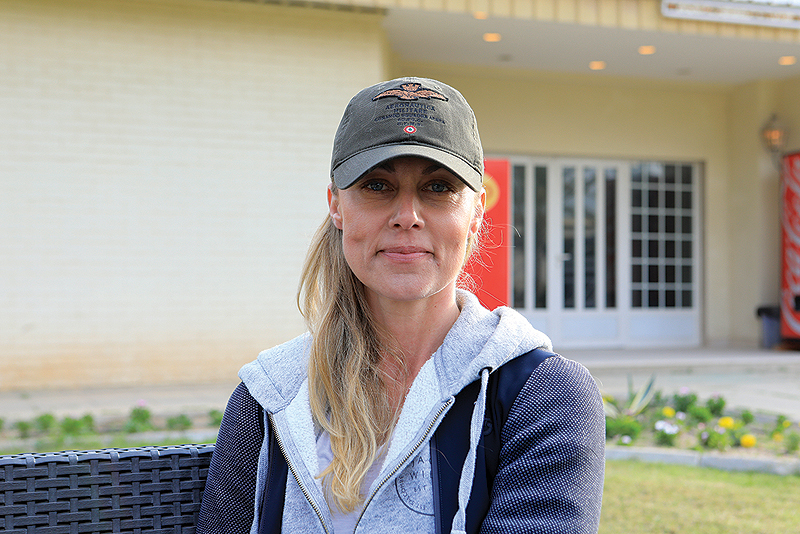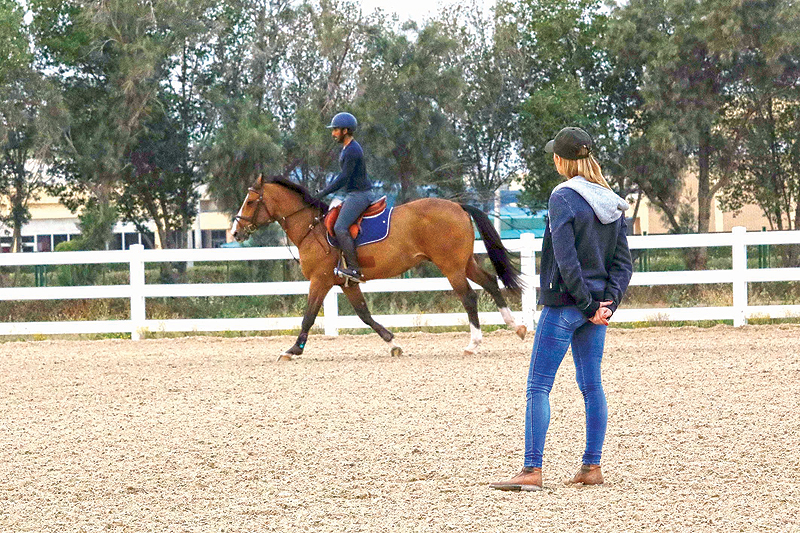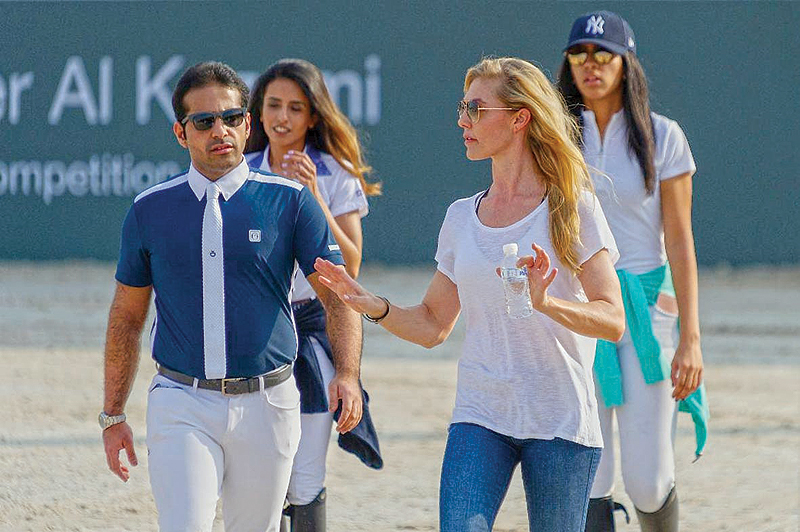Expat trainer explains equestrian experience in Kuwait

Neel Zum Vohrde turned her love for equines into her profession - she now trains horses for a living at Kuwait's Equestrian Club. Born in Denmark, she grew up with horses and started riding from an early age. "I grew up with this hobby. I was very lucky to have a mother who was a rider and owned a riding school in Denmark. I had a passion for this sport, so I worked alongside my mother, coaching, riding and schooling horses and ponies," she told Kuwait Times.
Vohrde began her career in Denmark, working there for about 10 years, followed by a year in Germany. She then decided to head overseas, so she went to Dubai, where she coached for seven seasons. She moved to Kuwait in 2017. This is her second season training riders in Kuwait. "I was always curious as a person and wanted to travel and see the world. This was the opportunity to do so - with my sport. The way to improve is by seeking the best places, riders and trainers to work with," she said.

Vohrde chose the United Arab Emirates as there was a good opportunity there for a coach and rider. "It was an interesting place due to the potential they have, as there is money, which this sport requires. The sport was growing there. At that time I was considering the Arab region or America, and the opportunity came along in Dubai," she pointed out.
She is now 42 years old. "Being an athlete fulltime is not something I could continue doing, because I started having problems with my back. So I focus now on coaching riders on techniques and tools to improve and maintain their horses, so we can create sustainable progress," explained Vohrde. According to her, there is a lot of talent and potential here. "Central Europe is the center of equestrian sport, where it has its roots and where we find the best riders. We try to import the sport here so riders can progress and thrive. It will also help them maintain and school the horses they buy," she noted.

"Everything we do with the horse affects its behavior later, which affects the end result. It's not a car - it's a horse - so we can influence it. It's important that we - in terms of horse welfare, schooling, managing, training, vets, and everything associated with this sport - do things in the right way to make it sustainable and add value," Vohrde said.
The horses are walked about six days a week, and have a day off. "Currently I work with eight students. We work together for a couple of hours every week, and we watch shows. Every week there is a new competition and we manage the training according to this competition. We also have big competitions such as the Amir's Cup (show jumping) and others," she stressed.
Vohrde trains competition riders. "It's up to them to improve and progress in this sport. I mainly train riders aged 16 and older, but I also had some talented junior riders aged 12 and 14 whom I trained occasionally," she added. Her riders are students or employees, so they are busy in the morning and come in the afternoon for training. "We train in the arena; then depending on the days, we ride flatwork and jump them about two days before the show. We supple the horse to make it fresh for the show. On weekends, we have competitions," she said.
"The grooms take care of stable management. They clean the stables, feed the horses and hand walk the horses twice a day. It's the same in summer and winter, but usually the horses fly to Europe to be part of the top sport there. In Kuwait, it's only seasonal due to the climate. So they stay approximately eight months here and four in Europe. This month the horses start to fly out, and I'm going with them as well, as there are no competitions in the summer here in Kuwait," noted Vohrde.
There are three clubs in Kuwait where competitions are held. "Sometimes it's here (Equestrian Club), Kuwait Riding Center or Messila Club, which all host equestrian events. The competitions usually start in the morning, then after a short break, continue in the afternoon," she added. Vohrde loves her work. "When I finished school, I took a professional master's course. We have a very strong educational system in Europe to develop coaches and athletes," she highlighted.
The most difficult part of this profession is that it's very money-dependent, so very strong backup support is needed, as horses are very expensive to buy and maintain. "You need monthly expenses to keep a horse, and you need more of them as one horse is not enough," she said. "You are dealing with horses - and every horse has its own character and behavior. So a new horse is a new challenge. It takes a long time to get the experience to be able to ride many different horses. A good rider should be able to ride all kinds of horses. For me as a woman, one of the biggest changes is that men have more physical strength, which is an advantage for them, while I have to spend more time schooling my horse," Vohrde pointed out.
Some horses suit men better, while others fit women better. "At the end, it's about technique and about being able to balance your horse. It's not like playing piano or tennis where you can train 12 hours a day - with horses, you train once a day, so if you want to be better, you have to ride as many horses as possible to get the routine in the rink," she explained.
"I train horses for clients and help riders train their horses and make them ready for shows. I mostly focus on schooling horses and riders, which is the field of my education. I don't compete anymore, and only do coaching. There is a lot of work and responsibility associated with equestrian sport. Like other sports, if you want to do it at a high level, it's a lifestyle. It needs work all the time, so you need to say no to other things. As horses are our partners, they should get the right nutrition, rest and training," concluded Vohrde.
By Nawara Fattahova
.jpg)



